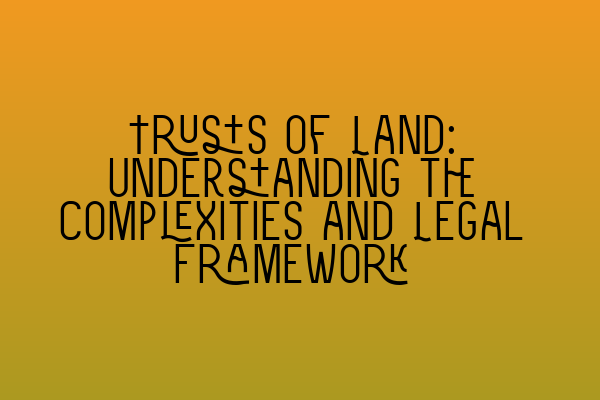Trusts of Land: Understanding the Complexities and Legal Framework
Welcome to the SQE Property Law & Land Law blog, where we provide expert insight and analysis on a wide range of legal topics. In this article, we will delve into the complexities of trusts of land, exploring the legal framework surrounding them. Whether you are a solicitor, a law student, or simply have an interest in property law, this post aims to provide a comprehensive understanding of this intricate area.
A trust of land, as the name suggests, revolves around the creation of a trust with land as its subject matter. It is a legal arrangement wherein the legal ownership and beneficial ownership of land are separated. While the legal owner, known as the trustee, holds the legal title to the land, the beneficial ownership lies with the beneficiaries.
A trust of land can arise in various scenarios, such as family homes, investment properties, or agricultural land. It can be created expressly through a written document, such as a trust deed, or arise implicitly through the conduct and intentions of the parties involved.
One of the key features of trusts of land is the concept of equitable interests. Equitable interests represent the beneficiaries’ rights to the land and are enforceable in equity rather than at common law. This means that even though the legal owner holds the formal title, they are bound to act in accordance with the beneficiaries’ interests.
The legal framework governing trusts of land is primarily outlined in the Law of Property Act 1925 and the Trusts of Land and Appointment of Trustees Act 1996. These statutes provide the foundation for the creation, management, and enforcement of trusts of land.
Under the Law of Property Act 1925, trusts of land are subject to certain formalities. For example, any declaration of trust must be in writing and signed by the legal owner. This requirement ensures that the creation and transfer of equitable interests in land are legally valid and enforceable.
In addition to the formalities, the Trusts of Land and Appointment of Trustees Act 1996 introduced a statutory framework for trusts of land. This act provides guidance on the powers and duties of trustees, the resolution of disputes, and the court’s jurisdiction over trusts of land.
To fully understand the complexities of trusts of land, it is essential to familiarize yourself with the relevant case law. Landmark cases, such as Stack v Dowden [2007] UKHL 17 and Jones v Kernott [2011] UKSC 53, have shaped the legal principles surrounding trusts of land. These cases have clarified issues relating to the division of beneficial interests, the intention of the parties, and the determination of beneficial ownership in different factual scenarios.
Practitioners working within the field of trusts of land must also consider other factors, such as taxation implications, the impact of family law, and the potential for disputes among beneficiaries. Understanding these ancillary aspects is crucial for providing comprehensive advice to clients and ensuring their interests are protected.
At SQE Property Law & Land Law, we offer a range of preparation courses for the Solicitors Qualifying Examination (SQE), including SQE 1 and SQE 2. Our courses are designed to equip aspiring solicitors with the knowledge and skills required to navigate complex legal areas, such as trusts of land. We also provide practice exam questions and mocks to help candidates test their understanding and gauge their readiness for the SQE exams.
In conclusion, trusts of land form a vital component of property law, involving the separation of legal and beneficial ownership rights. Navigating the legal framework surrounding trusts of land requires a deep understanding of the relevant statutes, case law, and ancillary considerations. This article serves as a starting point for individuals seeking to gain insight into this intricate area of law. For further information and guidance, we invite you to explore our SQE 1 and SQE 2 preparation courses, as well as our practice exam questions and mock exams.
To read more about Trusts of Land, you can also check out these related articles:
– SQE 1 Practice Exam Questions
– SQE 1 Practice Mocks FLK1 FLK2
– SQE 2 Preparation Courses
– SQE 1 Preparation Courses
– SRA SQE Exam Dates
We hope you found this article insightful and informative. If you have any further questions or would like to explore our services, please do not hesitate to contact us. Stay tuned for more expert content on SQE Property Law & Land Law.
